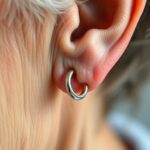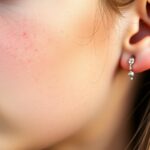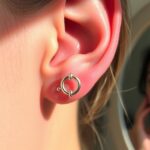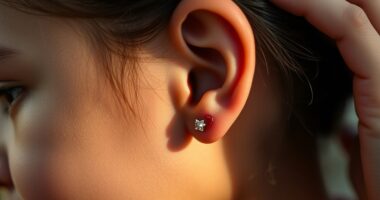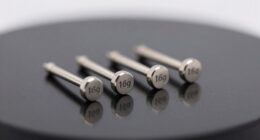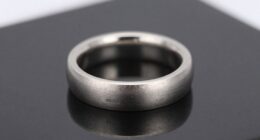During menopause, hormonal changes reduce collagen production, making your skin and tissue around piercings less elastic and more fragile. This can cause jewelry to feellooser, cause discomfort, or even lead to tearing or stretching. Healing slows, and increased sensitivity may lead to irritation or damage. To keep your piercings healthy, choose hypoallergenic jewelry, monitor for issues, and adjust your jewelry and skincare routines. If you keep exploring, you’ll discover helpful tips to protect and care for your piercings during this time.
Key Takeaways
- Hormonal changes reduce collagen, leading to less skin elasticity and increased vulnerability around piercings.
- Piercing jewelry may loosen or shift due to decreased tissue firmness, affecting comfort and appearance.
- Slower healing and fragile skin increase infection risk and potential for tearing or irritation.
- Regularly monitor piercings and choose hypoallergenic, flexible jewelry to accommodate tissue changes.
- Proper skincare and professional advice help prevent complications and maintain safe, comfortable piercings during menopause.
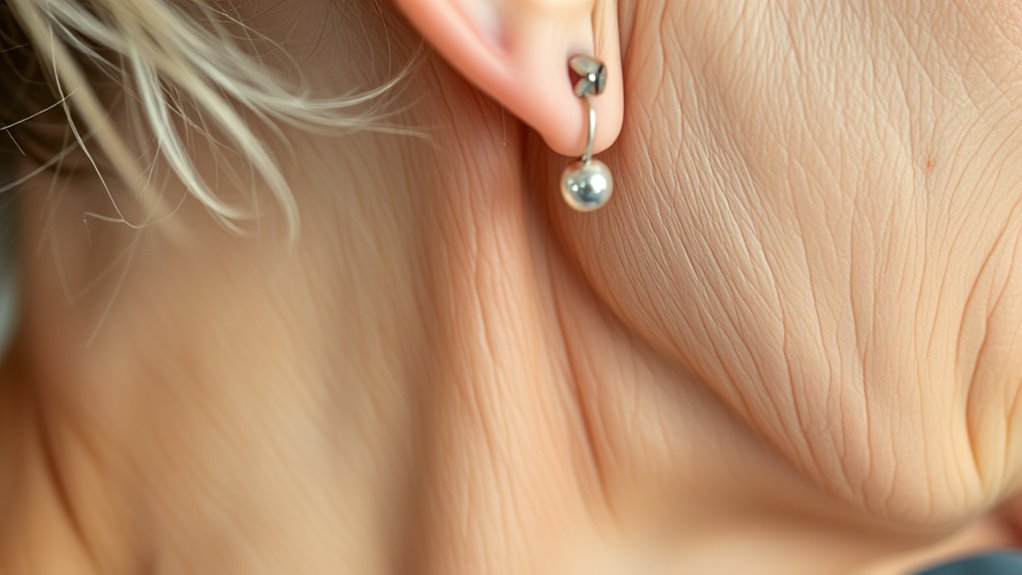
Many women with piercings notice changes in their jewelry during menopause, as hormonal fluctuations can affect skin and tissue elasticity. As your hormone levels shift, especially during this stage, you might observe that the skin around your piercings becomes less firm and more prone to stretching or sagging. These hormonal fluctuations impact collagen production, which directly influences skin elasticity, making the tissue around your piercings more fragile. This isn’t just about appearance; it can also lead to increased sensitivity or discomfort in the pierced areas.
Hormonal changes during menopause can weaken skin around piercings, increasing sensitivity and discomfort.
You may find that jewelry that once fit comfortably now feels looser or tighter, depending on how your tissue responds. Reduced skin elasticity means your body might not hold jewelry as securely, increasing the risk of jewelry shifting or even tearing through the skin if it becomes too lax. Conversely, some women experience swelling or irritation because the tissue is more delicate and reacts differently to jewelry materials or movement. It’s important to pay close attention to how your body is changing and adjust accordingly to avoid complications.
Hormonal fluctuations during menopause can also slow down the healing process of new piercings or even affect existing ones. If your skin’s elasticity decreases, it might take longer for piercings to heal, raising the chance of infections or irritation. This can be especially problematic if you’re considering new piercings or have recently gotten one. Additionally, the decrease in collagen can cause the skin to thin, making it more susceptible to tearing or damage from jewelry or accidental pulls. Skin health can also decline during this period, further influencing the condition of your piercings.
To manage these changes, you should regularly check your piercings for signs of irritation, loosening, or tearing. Choosing jewelry made from hypoallergenic materials like surgical steel or titanium can help minimize irritation. You might also want to switch to smaller or more flexible jewelry pieces that accommodate changes in your tissue. Maintaining a good skincare routine that supports skin health, such as moisturizing and protecting against dryness, can help preserve your skin’s elasticity as much as possible. If you notice persistent discomfort or unusual changes, consulting a professional piercer or dermatologist is a wise step.
Understanding how hormonal fluctuations influence skin elasticity helps you make informed decisions about caring for your piercings during menopause. Adjusting your jewelry choices and skincare routines can minimize discomfort and prevent complications, ensuring your piercings remain safe and comfortable during this phase of life.
Frequently Asked Questions
Do Piercings Affect Menopause Symptoms?
You might wonder if piercings affect menopause symptoms. While piercings don’t directly influence hormonal skin or menopause, hormonal changes can increase piercing sensitivity and skin reactions. During menopause, your skin becomes more sensitive and prone to irritation, which could make piercing care more important. Keep an eye on skin changes and consult your dermatologist if you notice increased sensitivity, ensuring your piercings stay healthy throughout this *shift*.
Can Menopause Cause Piercings to Heal Slower?
Menopause can cause piercings to heal slower because hormonal changes affect skin elasticity and moisture levels. You might notice your piercing jewelry takes longer to heal as your skin becomes thinner and less elastic. This delayed healing is normal, so avoid removing jewelry too early. Keep the area clean and moisturized, and give your body time to adapt to these changes during menopause.
Are Certain Piercings More Prone to Skin Changes?
Certain piercings are more prone to skin changes because of factors like piercing material and jewelry design. You might notice that metal types like nickel cause more irritation, especially during menopause when skin becomes more sensitive. Designs that trap moisture or irritate the skin can lead to slower healing or complications. Choosing hypoallergenic materials and smooth, simple jewelry can help minimize skin issues and promote better healing.
How Does Hormonal Change Impact Piercing Care?
Hormonal fluctuations during menopause can affect your piercing care by reducing skin elasticity and making your skin more sensitive. You might notice increased dryness or irritation around your piercings. To keep them healthy, you should clean your piercings gently and avoid harsh products. Staying attentive to your skin’s changing needs helps prevent infections and promotes healing, ensuring your piercings stay beautiful and comfortable despite hormonal shifts.
Should I Remove Piercings During Menopause?
Think of your piercings as tiny anchors in your skin’s journey. During menopause, hormonal shifts can affect piercing safety and skincare routines, making it wise to contemplate whether to keep or remove them. You might find that adjusting jewelry or maintaining diligent skincare helps your skin adapt. Ultimately, listening to your body and consulting with a dermatologist ensures your piercings stay safe and beautiful through this change.
Conclusion
Even if you’re worried about your piercings changing during menopause, remember that proper care can keep your skin healthy. Don’t let fears of skin changes stop you from expressing yourself or enjoying your favorite jewelry. With regular hygiene and mindful monitoring, you can confidently wear piercings through this natural phase. Embrace these changes as part of your journey—your style and confidence can shine just as brightly, no matter what life stage you’re in.




